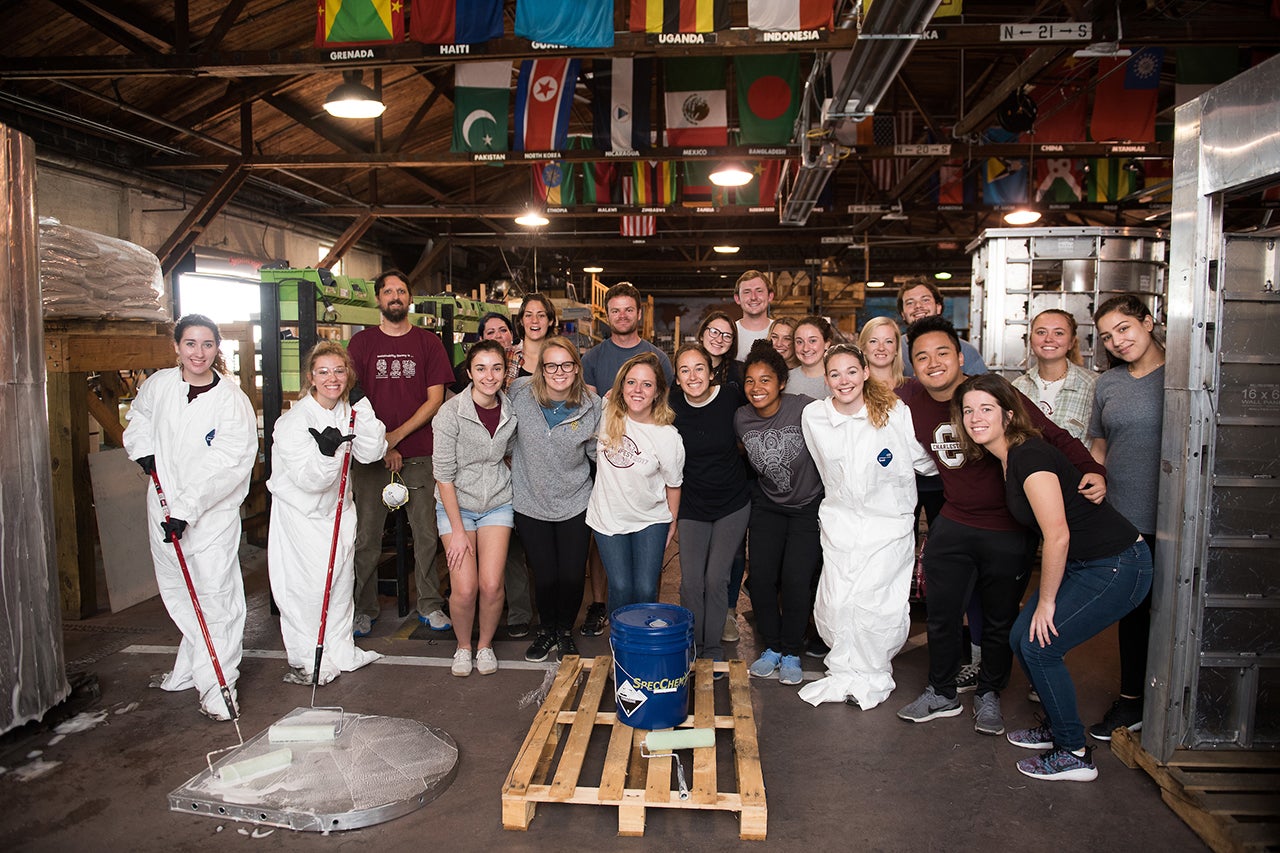It’s easy to take clean water for granted. But as the recent hurricanes that ravaged Puerto Rico and other places demonstrated, this precious resource is guaranteed to no one. That’s the message that was driven home to a group of College of Charleston students who took part in a recent experiential learning project sponsored by the Sustainability Literacy Institute, the home of the College’s Quality Enhancement Plan on “Sustainability Literacy as a Bridge to Addressing 21st Century Problems.”
 On Oct. 28, 2017, the students visited Water Mission International in North Charleston to help assemble a water sanitization system. The system they built was recently placed in Cougar Mall on the CofC campus and will remain on display through the end of the spring semester.
On Oct. 28, 2017, the students visited Water Mission International in North Charleston to help assemble a water sanitization system. The system they built was recently placed in Cougar Mall on the CofC campus and will remain on display through the end of the spring semester.
Water Mission was founded by environmental engineers George and Molly Greene, who developed their first water filtration and chlorination unit in 1998. The company’s units are sent to locations throughout the world in order to provide clean water to towns and countries that don’t have access to it.
Todd LeVasseur ’97, director of the Sustainability Literacy Institute and a visiting assistant professor of religious studies and environmental and sustainability studies, led the group of 30 students on this experiential learning project. He advocates for the importance of water sustainability, not just on a local level, but internationally as well. He believes that displaying the filtration system on campus will allow passing students to learn more about 21st-century problems that College of Charleston students will have to solve related to the interface of social, environmental and economic systems and inspire them to go out and make a difference.
“We take for granted our access to clean water,” says LeVasseur. “We want everybody on campus to realize that what we have isn’t guaranteed. We need to protect it through social, environmental, and economic policies. That’s one of the reasons why we chose water quality and access as the 2017-18 theme for the College’s Quality Enhancement Plan. And we’re promoting that through the use of the hashtag #WaterYouThinking?”
Sophomore Suzanna Ellison, a biology major and one of the students who took part in the learning project, also recognizes that water instability isn’t a problem that can be easily solved. She’d heard about Water Mission through her environmental studies minor and was excited about the hands-on experience she received. She believes the filtration system will educate students about prevalent issues facing our planet.
 “Students should know that what is needed in many places is the same long-lasting quality of water that we drink in the United States,” Ellison says. “It is easy to help.”
“Students should know that what is needed in many places is the same long-lasting quality of water that we drink in the United States,” Ellison says. “It is easy to help.”
According to senior Audrey Noonan, the field trip wasn’t just an opportunity to volunteer, but was also a chance to learn more about water insecurity and shortages worldwide. She also gained practical knowledge about filtration systems, such as the materials and steps involved in building them.
“I think it’s important for other students to know about the filtration system because we take for granted where our water comes from,” says Noonan, a Spanish major.
Bonnie Hanna, volunteer programs supervisor at Water Mission, says the company’s supply of filtration systems is currently low due to the many disaster relief responses in the Caribbean. The system the students built will either be used to restock the organization’s supply or will be shipped to Puerto Rico to aid in the relief effort.
Students who want to get more involved with sustainability literacy on campus have a plethora of options to choose from. They can work with the Student Government Association on a proposed plastic water bottle ban. They can apply for Sustainability Literacy Institute mini-grants for up to $1,000 to do a project or event related to the Quality Enhancement Plan’s 2017-18 theme of water sustainability. Or they can take sustainability-related courses offered in Spring 2018.
All photos by Reese Moore
Lilly Frederick is a junior from San Diego studying English and creative writing at the College of Charleston. She is also an Orientation Intern for the Office of New Student Programs.





